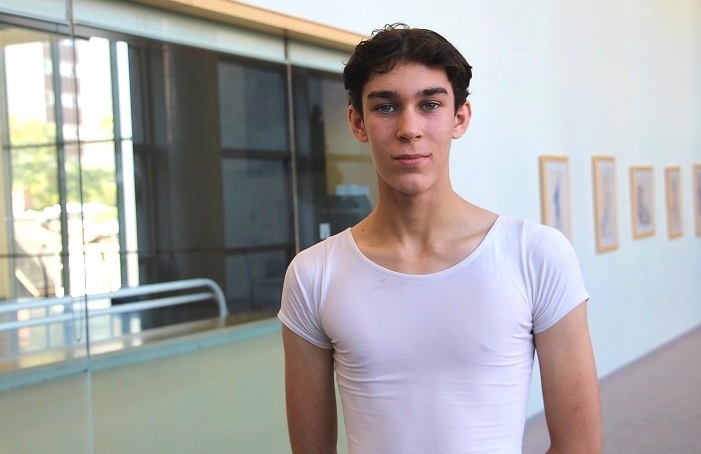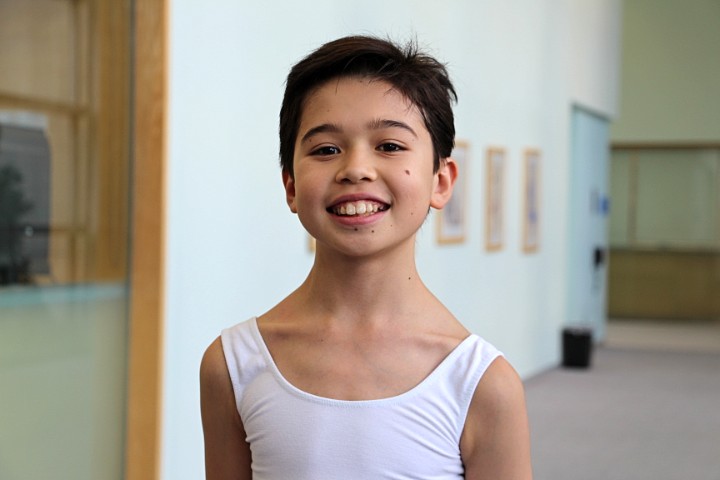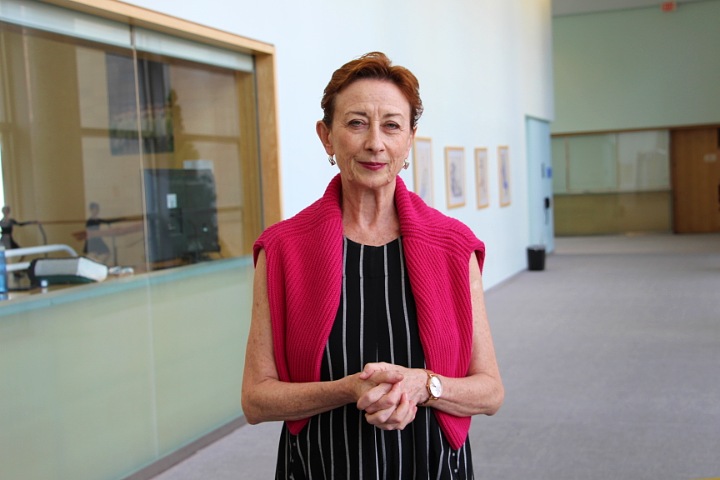As Canada’s National Ballet School celebrates its 60th anniversary this year, its 2019-2020 class is set to embrace an exciting first for the downtown Toronto institution: a majority of the students set to graduate are boys.

“Is it remarkable that 60 per cent of this year’s graduating class is male? Yes, absolutely, and deeply exciting,” Mavis Staines, artistic director and CEO of Canada’s National Ballet School, told Global News.
“I am really in awe of the number of parents who are now standing up for the fact that boys have as much right to speak this vibrant, dynamic, really, really demanding language as females do.”
Of the class set to graduate in June, there are 16 boys and 11 girls — a level of gender balance that has been years in the making.
“We do need to tackle the stereotypes head on,” Staines said.
“Within Canada, until the last 10 years, it was highly unusual for parents to be able to be supportive of their sons pursuing their career as professional dancer, or even taking ballet as a hobby.
“These kind of systemic changes don’t happen quickly, so I’ve been watching this group of young men build in numbers for the past seven years. But the fact is … they’re all so clear about dance being their language, and this being the profession they want within this next chapter of their lives.”
The stereotypes that ballet is feminine and primarily for women and girls have been prevalent for years.
As recently as last month, controversy briefly arose when Good Morning America Lara Spencer came under fire for mocking the fact that Prince George took ballet lessons in school. It sparked an outcry from many, prompting the host to issue an apology the next day.
‘It’s everything I’ve known’

Ethan Rodrigues, a 17-year-old Grade 12 student from Guelph, Ont., has been at the school since Grade 6.
Like many of his friends, he said he was looking for an outlet for his energy. Rodrigues said he tried contemporary, tap and hip-hop dancing but it was his father that encouraged him to apply to ballet school.
“For me it’s everything I’ve known,” he told Global News.
“In ballet, in general, everything you learn applies to everything in life. You must go down to go down, the same in life — it’s very subjective. Everything I learn in ballet I can apply to the rest of my life.”
- Ontario enters March with frigid cold snap as wind chills plummet
- Markham man who drove impaired, killing off-duty YRP officer, receives 6-year sentence
- Premier wants to see ‘gold mine’ airport in downtown Toronto expanded for jets
- DNA leads to arrest 20 years after newborn found dead on Ontario trail
Rodrigues said he has heard the misconceptions about male ballet performers, adding he and others as artists are — at times — intensely questioned during day-to-day tasks or at family gatherings.

Get daily National news
“We as a collective, we as dancers, we as humans, we get questioned every day of why we are doing what we do and why we love what we love,” he said.
“It’s not always about the tutus and the pretty costumes and things like that. It’s really very, very difficult. You must work hard every day. It’s not something you do, it’s something you are. It’s something that’s your lifestyle.
READ MORE: Ballet dancers make the most of 5-hour airport layover
“‘Why is it you’re doing what you’re doing? This sport is for girls or whatever.’ It’s an appreciation for art, it’s an appreciation for physicality, it’s an appreciation for… something unearthly… ballet is so, so beautifully elegant and so powerful — I don’t think I could live with myself if I wasn’t dancing.”
Rodrigues and the other professional students also study academically at the school and get credits under the Ontario curriculum. This summer he said he went to Paris on exchange.
After graduation, Rodrigues said he wants to continue to improve strength training as well as flexibility. However, he said he wants to pursue post-secondary studies before joining a ballet company.
‘It takes a lot of discipline’
At 12 years old, Grade 7 student Antoine Fong-Lesage is relatively new to the halls of the National Ballet School. He said while the formalized training is new to him, the school isn’t — he’s been dancing since he was five.
“My sister did ballet and I always wanted to mimic my sister as a little brother, so I decided to do ballet myself and my parents were fine with it,” he told Global News.
“I didn’t really love ballet because I had to wake up in the morning and miss my video game time, but I grew to love it.”
Like Rodrigues, Fong-Lesage is all too familiar with the stereotypes — even at his younger age — and said he wants some people to reassess their understanding of the art.
“It takes a lot of discipline. Something I hate is the stereotype is it’s just tutus and lovey-dovey things. But really, it’s really hard. I didn’t expect it to be this hard,” he said.
“The first week of my first professional training, I could barely walk down stairs. I was so sore … it’s very hard physically. Sometimes you really just have to push yourself because not everything can be done at first.”
Advice for aspiring ballet professionals — and a challenge
Staines, who noted ballet professionals can stay involved for at least a decade longer compared to past generations due to advances in medicine and technique, said the art form has evolved beyond “a niche market pastime.”
She said through pieces like Billy Elliot, dance shows on TV (such as So You Think You Can Dance), social media and community outreach initiatives hosted by institutions such as the National Ballet School, the opportunities to embrace ballet and dance are more available than ever.
For anyone thinking about ballet, Fong-Lesage encouraged fellow children and others to keep pushing through if they think the art form is for them.
“You probably won’t feel the passion at first, but then you’ll really love it and grow into it,” he said.
“It’s really a big commitment, but once you love it, it’s just there. It’s always there no matter what — out of ballet class, on the streets — it will always be there with you.”
Rodrigues echoed Fong-Lesage’s sentiments and offered a challenge for those who still question the craft and those who embrace it.
“If you have passion for ballet, or anything in general, please, please, please follow that passion. We need more passion in the world, we need more vulnerability, we need more strength, we need more generosity,” he said.
“Beauty is subjective. Ballet is symbolic and subjective. If you don’t like it, that’s fine — you don’t need to because there are millions of people in the world who will go to those performances and feel enriched.
“Try and appreciate it. We try our hardest and if you can learn to appreciate it, you can learn to love because ballet on its own offers a magnitude of life lessons. It can guide you in the darkest of times and it can lead you to greatness.”














Comments
Want to discuss? Please read our Commenting Policy first.